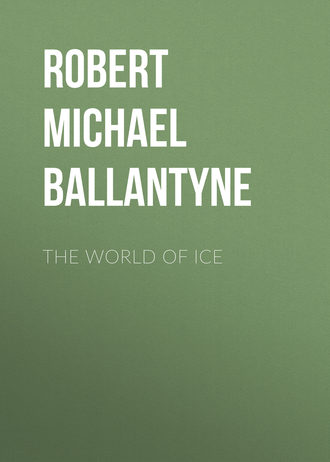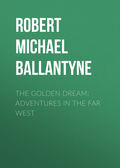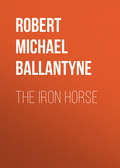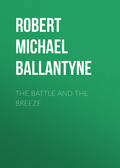
Robert Michael Ballantyne
The World of Ice
While Singleton was examining the red snow, and vainly endeavouring to ascertain the nature of the minute specks of matter by which it was coloured, Fred continued to gaze with a look of increasing earnestness towards the tall column, around which a bank of fog was spreading, and partially concealing it from view. At length he attracted the attention of his companion towards it.
"I say, I'm half inclined to believe that yon is no work of nature, but a monument set up to attract the attention of ships. Don't you think so?"
Singleton regarded the object in question for some time. "I don't think so, Fred; it is larger than you suppose, for the fog-bank deceives us. But let us go and see; it cannot be far off."
As they drew near to the tall rock, Fred's hopes began to fade, and soon were utterly quenched by the fog clearing away, and showing that the column was indeed of nature's own constructing. It was a single, solitary shaft of green limestone, which stood on the brink of a deep ravine, and was marked by the slaty limestone that once encased it. The length of the column was apparently about five hundred feet, and the pedestal of sandstone on which it stood was itself upwards of two hundred feet high.
This magnificent column seemed the flag-staff of a gigantic crystal fortress, which was suddenly revealed by the clearing away of the fog-bank to the north. It was the face of the great glacier of the interior, which here presented an unbroken perpendicular front—a sweep of solid glassy wall, which rose three hundred feet above the water-level, with an unknown depth below it. The sun glittered on the crags and peaks and battlements of this ice fortress, as if the mysterious inhabitants of the Far North had lit up their fires and planted their artillery to resist further invasion.
The effect upon the minds of the two youths, who were probably the first to gaze upon those wondrous visions of the Icy Regions, was tremendous. For a long time neither of them could utter a word, and it would be idle to attempt to transcribe the language in which, at length, their excited feelings sought to escape. It was not until their backs had been for some time turned on the scene, and the cape near the valley of red snow had completely shut it out from view, that they could condescend to converse again in their ordinary tones on ordinary subjects.
As they hastened back over the ice-belt at the foot of the cliffs, a loud boom rang out in the distance and rolled in solemn echoes along the shore.
"There goes a gun," exclaimed Tom Singleton, hastily pulling out his watch. "Hallo! do you know what time it is?"
"Pretty late, I suppose. It was afternoon, I know, when we started, and we must have been out a good while now. What time is it?"
"Just two o'clock in the morning!"
"What! do you mean to say it was yesterday when we started, and that we've been walking all night, and got into to-morrow morning without knowing it?"
"Even so, Fred. We have overshot our time, and the captain is signalling us to make haste. He said that he would not fire unless there seemed some prospect of the ice moving, so we had better run, unless we wish to be left behind; come along."
They had not proceeded more than half-a-mile when a Polar bear walked leisurely out from behind a lump of ice, where it had been regaling itself on a dead seal, and sauntered slowly out towards the icebergs seaward, not a hundred yards in advance of them.
"Hallo! look there! what a monster!" shouted Fred, as he cocked his musket and sprang forward. "What'll you do, Tom, you've no gun?"
"Never mind, I'll do what I can with the hammer. Only make sure you don't miss. Don't fire till you are quite close to him."
They were running after the bear at top speed while they thus conversed in hasty and broken sentences, when suddenly they came to a yawning crack in the ice, about thirty feet wide, and a mile long on either hand, with the rising tide boiling at the bottom of it. Bruin's pursuers came to an abrupt halt.
"Now, isn't that disgusting?"
Probably it was, and the expression of chagrin on Fred's countenance as he said so evidently showed that he meant it; but there is no doubt that this interruption to their hunt was extremely fortunate, for to attack a Polar bear with a musket charged only with small shot, and a geological hammer, would have been about as safe and successful an operation as trying to stop a locomotive with one's hand. Neither of them had yet had experience of the enormous strength of this white monarch of the Frozen Regions and his tenacity of life, although both were reckless enough to rush at him with any arms they chanced to have.
"Give him a long shot—quick!" cried Singleton.
Fred fired instantly; and the bear stopped, and looked round, as much as to say, "Did you speak, gentlemen?" Then, not receiving a reply, he walked away with dignified indifference, and disappeared among the ice-hummocks.
An hour afterwards the two wanderers were seated at a comfortable breakfast in the cabin of the Dolphin, relating their adventures to the captain and mates, and, although unwittingly, to Mivins, who generally managed so to place himself, while engaged in the mysterious operations of his little pantry, that most of the cabin talk reached his ear, and travelled thence through his mouth to the forecastle. The captain was fully aware of this fact, but he winked at it, for there was nothing but friendly feeling on board the ship, and no secrets. When, however, matters of serious import had to be discussed, the cabin door was closed, and Mivins turned to expend himself on Davie Summers, who, in the capacity of a listener, was absolutely necessary to the comfortable existence of the worthy steward.
Having exhausted their appetites and their information, Fred and Tom were told that, during their absence, a bear and two seals had been shot by Meetuck, the Esquimau interpreter, whom they had taken on board at Upernavik; and they were further informed that the ice was in motion to the westward, and that there was every probability of their being released by the falling tide. Having duly and silently weighed these facts for a few minutes, they simultaneously, and as if by a common impulse, yawned, and retired to bed.
CHAPTER IX
The "Dolphin" gets beset in the ice—Preparations for wintering in the ice—Captain Guy's code of laws.
An accident now befell the Dolphin which effectually decided the fate of the ship and her crew, at least for that winter. This was her getting aground near the ravine of the giant flagstaff before mentioned, and being finally beset by ice, from which all efforts on the part of the men to extricate her proved abortive, and in which she was ultimately frozen in, hard and fast.
The first sight the crew obtained of the red snow filled them with unbounded amazement, and a few of the more superstitious amongst them with awe approaching to fear. But soon their attention was attracted from this by the wonderful column.
"Och, then! may I niver!" exclaimed O'Riley, the moment he caught sight of it, "if there ben't the north pole at long last—sure enough!"
The laugh that greeted this remark was almost immediately checked, partly from the feelings of solemnity inspired by the magnificent view which opened up to them, and partly from a suspicion on the part of the more ignorant among the men that there might be some truth in O'Riley's statement after all.
But their attention and energies were speedily called to the dangerous position of the ship, which unexpectedly took the ground in a bay where the water proved to be unusually shallow, and before they could warp her off the ice closed round her in compact, immovable masses. At first Captain Guy was not seriously alarmed by this untoward event, although he felt a little chagrin in consequence of the detention, for the summer was rapidly advancing, and it behoved him to return to Baffin's Bay and prosecute the whale-fishing as energetically as possible; but when day after day passed, and the ice round the ship still remained immovable, he became alarmed, and sought by every means in his power to extricate himself.
His position was rendered all the more aggravating by the fact that, a week after he was beset, the main body of the ice in the strait opened up and drifted to the southward, leaving a comparatively clear sea through which he could have pushed his way without much difficulty in any direction; but the solid masses in which they lay embedded were fast to the ground for about fifty yards beyond the vessel, seaward, and until these should be floated away there was no chance of escape.
"Get up some powder and canisters, Mr. Bolton," he exclaimed, one morning after breakfast, "I'll try what can be done by blasting the ice. The highest spring tide will occur to-morrow, and if the ship don't move then we shall—"
He did not finish the sentence, but turned on his heel and walked forward, where he found Buzzby and some of the men preparing the ice-saws.
"Ay, ay," muttered the mate, as he went below to give the necessary directions, "you don't need to conclude your speech, captain. If we don't get out to-morrow, we're locked up for one winter, at least, if not more."
"Ay, and ye'll no get oot to-morrow," remarked Saunders, with a shake of his head as he looked up from the log-book in which he was making an entry. "We're hard and fast, so we'll just have to make the best o't."
Saunders was right, as the efforts of the next day proved. The ice lay around the vessel in solid masses, as we have said, and with each of the last three tides these masses had been slightly moved. Saws and ice chisels, therefore, had been in constant operation, and the men worked with the utmost energy, night and day, taking it by turns, and having double allowance of hot coffee served out to them. We may mention here that the Dolphin carried no spirits, except what was needed for medicinal purposes, and for fuel to several small cooking lamps that had been recently invented. It had now been proved by many voyagers of experience that in cold countries, as well as hot, men work harder, and endure the extremity of hardship better, without strong drink than with it, and the Dolphin's crew were engaged on the distinct understanding that coffee, and tea, and chocolate were to be substituted for rum, and that spirits were never to be given to any one on board, except in cases of extreme necessity.
But, to return—although the men worked as only those can who toil for liberation from long imprisonment, no impression worth mentioning could be made on the ice. At length the attempt to rend it by means of gunpowder was made.
A jar containing about thirty pounds of powder was sunk in a hole in an immense block of ice which lay close against the stern of the ship. Mivins, being light of foot, was set to fire the train. He did so, and ran—ran so fast that he missed his footing in leaping over a chasm, and had well-nigh fallen into the water below. There was a whiz and a loud report, and the enormous mass of ice heaved upwards in the centre, and fell back in huge fragments. So far the result was satisfactory, and the men were immediately set to sink several charges in various directions around the vessel, to be in readiness for the highest tide, which was soon expected. Warps and hawsers were also got out and fixed to the seaward masses, ready to heave on them at a moment's notice; the ship was lightened as much as possible by lifting her stores upon the ice; and the whole crew—captain, mates, and all—worked and heaved like horses, until the perspiration streamed from their faces, while Mizzle kept supplying them with a constant deluge of hot coffee. Fred and the young surgeon, too, worked like the rest, with their coats off, handkerchiefs bound round their heads, and shirt-sleeves tucked up to their shoulders.
At last the tide rose—inch by inch, and slowly, as if it grudged to give them even a chance of escape.
Mivins grew impatient and unbelieving under it. "I don't think it'll rise another hinch," he remarked to O'Riley, who stood near him.
"Niver fear, boy. The capting knows a sight better than you do, and he says it'll rise a fut yit."
"Does he?" asked Grim, who was also beginning to despond.
"Ov coorse he does. Sure he towld me in a confidintial way, just before he wint to turn in last night—if it wasn't yisturday forenoon, for it's meself as niver knows an hour o' the day since the sun became dissipated, and tuck to sitting up all night in this fashion."
"Shut up yer tatie-trap and open yer weather-eye," muttered Buzzby, who had charge of the gang; "there'll be time enough to speak after we're off."
Gradually, as the tide rose, the ice and the ship moved, and it became evident that the latter was almost afloat, though the former seemed to be only partly raised from the ground. The men were at their several posts ready for instant action, and gazing in anxious expectation at the captain, who stood, watch in hand, ready to give the word.
"Now, then, fire!" he said in a low voice.
In a moment the ice round the ship was rent, and upheaved, as if some leviathan of the deep were rising from beneath it, and the vessel swung slowly round. A loud cheer burst from the men.
"Now, lads, heave with a will!" roared the captain.
Round went the capstan, the windlass clanked, and the ship forged slowly ahead, as the warps and hawsers became rigid. At that moment a heavy block of ice, which had been overbalanced by the motion of the vessel, fell with a crash on the rudder, splitting off a large portion of it, and drawing the iron bolts that held it completely out of the stern-post.
"Never mind; heave away—for your lives!" cried the captain. "Jump on board, all of you!"
The few men who had until now remained on the ice scrambled up the side. There was a sheet of ice right ahead which the ship could not clear, but which she was pushing out to sea in advance of her. Suddenly this took the ground and remained motionless.
"Out there with ice-chisels! Sink a hole like lightning! Prepare a canister, Mr. Bolton—quick!" shouted the captain in desperation, as he sprang over the side and assisted to cut into the unwieldy obstruction. The charge was soon fixed and fired, but it only split the block in two and left it motionless as before. A few minutes after the ship again grounded; the ice settled round her; the spring tide was lost, and they were not delivered.
Those who know the bitterness of repeated disappointment and of hope deferred, may judge of the feelings with which the crew of the Dolphin now regarded their position. Little, indeed, was said, but the grave looks of most of the men, and the absence of the usual laugh, and jest, and disposition to skylark, which, on almost all other occasions characterized them, showed too plainly how heavily the prospect of a winter in the Arctic Regions weighed upon their spirits. They continued their exertions to free the ship, however, for several days after the high tide, and did not finally give in until all reasonable hope of moving her was utterly annihilated. Before this, however, a reaction began to take place; the prospects of the coming winter were discussed; and some of the more sanguine looked even beyond the winter, and began to consider how they would contrive to get the ship out of her position into deep water again.
Fred Ellice, too, thought of his father, and this abrupt check to the search, and his spirits sank again as his hopes decayed. But poor Fred, like the others, at last discovered that it was of no use to repine, and that it was best to face his sorrows and difficulties "like a man!"
Alas! poor human nature; how difficult do we find it to face sorrows and difficulties cheerfully, even when we do conscientiously try! Well would it be for all of us could we submit to such, not only because they are inevitable, but because they are the will of God—of him who has asserted in his own Word that "he afflicteth not the children of men willingly."
Among so many men there were all shades of character, and the fact that they were doomed to a year's imprisonment in the Frozen Regions was received in very different ways. Some looked grave and thought of it seriously; others laughed and treated it lightly; a few grumbled and spoke profanely; but most of them became quickly reconciled, and in a week or two nearly all forgot the past and the future in the duties, and cares, and amusements of the present. Captain Guy and his officers, however, and a few of the more sedate men, among whom were Buzzby and Peter Grim, looked forward with much anxiety, knowing full well the dangers and trials that lay before them.
It is true the ship was provisioned for more than a year, but most of the provisions were salt, and Tom Singleton could have told them, had they required to be told, that without fresh provisions they stood a poor chance of escaping that dire disease scurvy, before which have fallen so many gallant tars whom nothing in the shape of dangers or difficulties could subdue. There were, indeed, myriads of wild-fowl flying about the ship, on which the men feasted and grew fat every day; and the muskets of Meetuck and those who accompanied him seldom failed to supply the ship with an abundance of the flesh of seals, walruses, and Polar bears, portions of all of which creatures were considered very good indeed by the men, and particularly by the dogs, which grew so fat that they began to acquire a very disreputable waddle in their gait as they walked the deck for exercise, which they seldom did, by the way, being passionately fond of sleep! But birds, and perchance beasts, might be expected to take themselves off when the winter arrived, and leave the crew without fresh food.
Then, although the Dolphin was supplied with every necessary for a whaling-expedition, and with many luxuries besides, she was ill provided with the supplies that men deem absolutely indispensable for a winter in the Arctic Regions, where the cold is so bitterly intense that, after a prolonged sojourn, men's minds become almost entirely engrossed by two clamant demands of nature—food and heat. They had only a small quantity of coal on board, and nothing except a few extra spars that could be used as a substitute, while the bleak shores afforded neither shrub nor tree of any kind. Meanwhile, they had a sufficiency of everything they required for at least two or three months to come, and for the rest, as Grim said, they had "stout hearts and strong arms."
As soon as it became apparent that they were to winter in the bay, which the captain named the Bay of Mercy, all further attempt to extricate the ship was abandoned, and every preparation for spending the winter was begun and carried out vigorously. It was now that Captain Guy's qualities as a leader began to be displayed. He knew, from long experience and observation, that in order to keep up the morale of any body of men it was absolutely necessary to maintain the strictest discipline. Indeed, this rule is so universal in its application, that many men find it advantageous to impose strict rules on themselves in the regulation of their time and affairs, in order to keep their own spirits under command. One of the captain's first resolves therefore was, to call the men together and address them on this subject; and he seized the occasion of the first Sabbath morning they spent in the Bay of Mercy, when the crew were assembled for prayers on the quarter-deck, to speak to them.
Hitherto we have not mentioned the Sabbath day in this story, because, while at sea, and while struggling with the ice, there was little to mark it from other days, except the cessation of unnecessary labour, and the reading of prayers to those who chose to attend; but as necessary labour preponderated at all times, and the reading of prayers occupied scarce half-an-hour, there was little perceptible difference between the Sabbath and any other day. We would not be understood to speak lightly of this difference. Little though it was in point of time and appearance, it was immeasurably great in fact, as it involved the great principle that the day of rest ought to be observed, and that the Creator should be honoured in a special manner on that day.
On the Sabbath in question—and it was an exceedingly bright, peaceful one—Captain Guy, having read part of the Church of England service as usual, stood up, and in an earnest, firm tone said:—
"My lads, I consider it my duty to say a few plain words to you in reference to our present situation and prospects. I feel that the responsibility of having brought you here rests very much upon myself, and I deem it my solemn duty, in more than the ordinary sense, to do all I can to get you out of the ice again. You know as well as I do that this is impossible at the present time, and that we are compelled to spend a winter here. Some of you know what that means, but the most of you know it only by hearsay, and that's much the same as knowing nothing about it at all. Before the winter is done your energies and endurance will probably be taxed to the uttermost. I think it right to be candid with you. The life before you will not be child's play, but I assure you that it may be mingled with much that will be pleasant and hearty if you choose to set about it in the right way. Well, then, to be short about it. There is no chance whatever of our getting through the winter in this ship comfortably, or even safely, unless the strictest discipline is maintained aboard. I know, for I've been in similar circumstances before, that when cold and hunger, and, it may be, sickness press upon us—should it please the Almighty to send these on us in great severity—you will feel duty to be irksome, and you'll think it useless, and perhaps be tempted to mutiny. Now, I ask you solemnly, while your minds are clear from all prejudices, each individually to sign a written code of laws, and a written promise that you will obey the same, and help me to enforce them even with the punishment of death, if need be. Now, lads, will you agree to that?"
"Agreed! agreed!" cried the men at once, and in a tone of prompt decision that convinced their leader he had their entire confidence—a matter of the highest importance in the critical circumstances in which they were placed.
"Well, then, I'll read the rules. They are few, but sufficiently comprehensive:—
"1st. Prayers shall be read every morning before breakfast, unless circumstances render it impossible to do so."
The captain laid down the paper, and looked earnestly at the men.
"My lads, I have never felt so strongly as I now do the absolute need we have of the blessing and guidance of the Almighty, and I am persuaded that it is our duty as well as our interest to begin, not only the Sabbath, but every day with prayer.
"2nd. The ordinary duties of the ship shall be carried on, the watches regularly set and relieved, regular hours observed, and the details of duty attended to in the usual way, as when in harbour.
"3rd. The officers shall take watch and watch about as heretofore, except when required to do otherwise. The log-books, and meteorological observations, etc., shall be carried on as usual.
"4th. The captain shall have supreme and absolute command as when at sea; but he, on his part, promises that, should any peculiar circumstance arise in which the safety of the crew or ship shall be implicated, he will, if the men are so disposed, call a council of the whole crew, in which case the decision of the majority shall become law, but the minority, in that event, shall have it in their option to separate from the majority and carry along with them their share of the general provisions.
"5th. Disobedience to orders shall be punishable according to the decision of a council to be appointed specially for the purpose of framing a criminal code, hereafter to be submitted for the approval of the crew."
The rules above laid down were signed by every man in the ship. Several of them could not write, but these affixed a cross (x) at the foot of the page, against which their names were written by the captain in presence of witnesses, which answered the same purpose. And from that time, until events occurred which rendered all such rules unnecessary, the work of the ship went on pleasantly and well.







